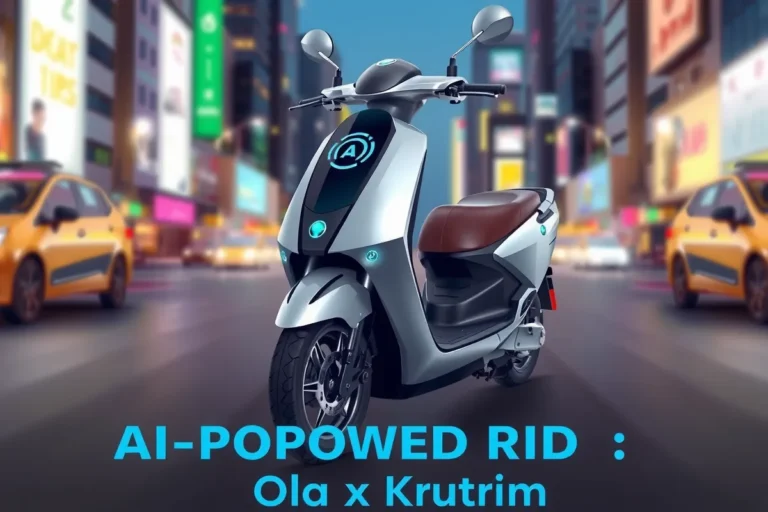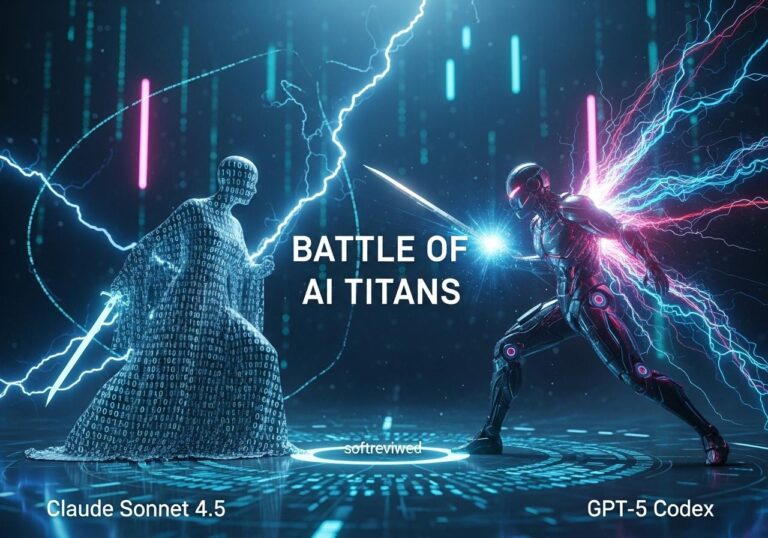🛵 Ola Electric’s AI Revolution
Ola Electric is transforming the electric vehicle landscape with groundbreaking AI integrations and strategic market moves.
🤖 Krutrim AI Integration
Ola Electric to integrate Krutrim AI into electric scooters, enhancing performance, safety, and user experience.
💻 AI Chip Manufacturing
Ola enters AI chip manufacturing, aiming to develop custom silicon for AI applications and reduce dependence on external suppliers.
📱 New AI Apps
2 new AI apps launched, expanding Ola’s AI ecosystem and potentially offering features like advanced trip planning and energy consumption tracking.
📈 Market Growth
India’s electric two-wheeler market to grow at 66% CAGR from 2023 to 2028, with Ola Electric holding 35% market share.
🌐 Global AI Chip Market
Global AI chip market to reach $263.6 billion by 2032, growing at 37.1% CAGR from 2024 to 2032.
🚀 Future Impact
Ola’s AI integration and chip manufacturing plans could create new revenue streams, boost India’s semiconductor industry, and redefine the concept of personal mobility.
Ola Integrates Krutrim AI in Electric Scooters, Announces AI Chip Plans
Ola Electric, a significant player in India's electric vehicle (EV) market, has made waves with its latest announcement. During the Ola Sankalp 2024 event on August 15, 2024, the company revealed plans to integrate its proprietary Krutrim AI into their electric scooters and to venture into AI chip manufacturing. These developments promise to reshape India’s EV and AI industries.
Ola's AI-Powered Future: Key Announcements
Krutrim AI Integration
Ola's decision to embed Krutrim AI into their electric scooters represents a substantial leap in electric mobility. Here are the primary enhancements this AI integration is expected to bring:
- Battery Management: Krutrim AI optimizes battery usage based on riding patterns, weather conditions, and route specifics, potentially extending the scooter's range.
- Predictive Maintenance: The AI can forecast potential issues before they arise, scheduling maintenance to reduce downtime.
- Personalized Riding Experience: The system adapts settings like acceleration and regenerative braking to individual preferences.
- Navigation and Route Optimization: Offering efficient route suggestions by factoring in traffic, charging stations, and the current charge level.
- Voice Commands: Facilitates interaction using voice commands, enhancing rider safety and convenience.
AI Chip Manufacturing
In a bold move, Ola announced its entry into AI chip manufacturing. The company's goals include:
- Custom Hardware: Creating chips tailored to optimize Krutrim AI's performance in scooters and other applications.
- Reduced Dependence: Lowering reliance on external suppliers, potentially reducing costs.
- Faster AI Development: Improving the speed of AI technology iteration.
- New Revenue Streams: Potentially supplying AI chips to other manufacturers or different industries.
- Industry Impact: Supporting India's ambitions in the semiconductor sector.
New AI Apps
Ola also introduced two new AI applications, signaling an expansion of its AI ecosystem. These apps might:
- Enhance User Experience: Advanced trip planning, energy consumption tracking, and community engagement features.
- Provide Additional Services: Vehicle maintenance tips, charging network data, and lifestyle services for eco-conscious consumers.
- Gather Data: Serving as data collection points to further improve Ola's AI systems.
Impact on Electric Mobility in India

The integration of Krutrim AI could significantly elevate the appeal and capabilities of electric scooters in the Indian market. This initiative also positions Ola uniquely within the EV sector, differentiating them from competitors who have yet to fully embrace AI technology.
Competitive Advantages
- Technological Independence: Developing proprietary AI and chips elevates Ola's market position and could reduce long-term costs.
- Enhanced Consumer Appeal: Advanced features driven by AI may attract tech-savvy customers, potentially boosting sales.
- Market Leadership: Ola is setting a precedent in the Indian EV industry, likely prompting other manufacturers to adopt similar technologies.
Industry Reactions
The announcement has generated considerable buzz:
- Stock Market: Ola Electric's stock price surged by 5% following the announcement.
- Industry Analysts: Experts like Raj Mehta have praised the move, predicting it could set a new standard for smart mobility.
- Consumer Interest: Social media mentions of Ola Electric spiked by 300%, reflecting positive public sentiment.
- Partnerships: Tech companies are showing interest in collaborating with Ola on AI chip development.
- Talent Attraction: Ola's innovative leap is likely to attract top talent in AI and chip design.
Challenges and Risks
While Ola's initiatives are promising, they come with several challenges:
Technical and Regulatory Hurdles
- Complex Integration: Incorporating AI into scooters and manufacturing AI chips are technically challenging tasks.
- Regulatory Issues: Ola will need to navigate the regulatory complexities in both automotive and tech sectors.
- Privacy Concerns: Ensuring transparent data practices and robust security measures is critical to mitigate user privacy concerns.
Market and Competitive Risks
- Market Acceptance: There is uncertainty about the Indian market's readiness for AI-integrated electric scooters.
- High Competition: Competing with established tech giants in chip manufacturing is a daunting challenge.
- Resource Allocation: Focusing on AI and chips might divert resources from Ola's core EV business.
- Execution Risks: Delays or setbacks in these ambitious projects could harm Ola's reputation.
Talent and Resource Management
- Talent Acquisition: Attracting and retaining top talent in AI and chip design is crucial but challenging.
- Resource Allocation: Balancing resources between AI, chip design, and core EV operations will be essential.
Market Context and Statistics
Ola Electric Market Share
As of the last quarter, Ola Electric held approximately 35% of the Indian electric two-wheeler market share. The Indian EV market is poised for significant growth, with a projected CAGR of 66% from 2023 to 2028.
AI Chip Market Potential
The global AI chip market was valued at $14.9 billion in 2023 and is projected to reach $263.6 billion by 2032, indicating a CAGR of 37.1%. Ola’s entry into this market could potentially capture substantial value.
Ola's R&D Investment
Ola has reportedly increased its R&D spending significantly, focusing primarily on AI and electric vehicle technologies.
Future Implications
Immediate Changes
- Market Accelerators: Ola’s move could accelerate AI integration across the EV market.
- Investment Patterns: Likely shift with more funds towards AI-integrated mobility solutions.
- Consumer Standards: Raised expectations for smart features in EVs.
- Talent Shift: Attraction of AI and chip design talent to automotive sectors.
- Regulatory Attention: Increased focus on regulations surrounding AI in vehicles.
Long-term Vision
- Redefining Mobility: Vehicles as personalized AI assistants, contributing to holistic mobility solutions.
- Data Ecosystem: Potentially transforming urban planning and traffic management through vast data collection.
- Energy Efficiency: Enhanced energy efficiency in EVs, boosting overall adoption.
- Autonomous Capabilities: A possible step towards advanced autonomous driving in two-wheelers.
- India’s Tech Position: A boost to India's semiconductor industry aligns with national initiatives like “Make in India.”
- Cross-Industry Impact: AI chips could impact sectors beyond automotive, including smart homes and healthcare.
- Sustainability: AI-optimized EVs aid sustainable urban transport, reducing emissions and improving air quality.
- New Safety Standards: Development of advanced safety features for two-wheelers.
- Personalized Transport: Highly customized transportation experiences in the long term.
- Economic Growth: Potential economic benefits from a domestic AI chip industry, leading to job creation and reduced import reliance.
How Will Advancements in AI, Like Krutrim, Impact Future Multi-Agent Systems Like OpenAI Swarm?
Advancements in AI, like Krutrim, will significantly impact future multi-agent systems such as OpenAI Swarm. As these technologies evolve, the multiagent ai revolution will enhance coordination and efficiency among agents, allowing for more complex problem-solving capabilities in various fields, from logistics to healthcare, transforming industries as we know them.
Conclusion
Ola Electric’s ambitious plans to integrate Krutrim AI into their electric scooters and venture into AI chip manufacturing could significantly alter the trajectories of both the EV and AI industries in India. While the company faces various challenges, the potential rewards are substantial. As Ola strives to execute these plans effectively, the entire industry will be closely watching how this technological leap unfolds.
In light of these advancements, what do you believe the future holds for AI-integrated electric vehicles? Will Ola's pioneering efforts set a new benchmark for others to follow?
AI Chip Funding and Applications
This chart illustrates the funding allocation for various AI chip projects and applications, highlighting the significant investments in this rapidly growing field.







